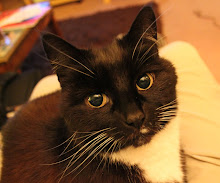In response to the very kind comment left by an anonymous friend in California, here (below) are my thoughts on Douglas Coupland's recent book, 'The Gum Thief' (Bloomsbury, £10.99):
Divorced, middle-aged, semi-alcoholic Roger stocks shelves at Staples, the office superstore. Bethany - a Goth in her late teens - works alongside him. The two have little to do with each other until Bethany discovers Roger’s notebook in the staff room and realises that, as well as writing a novel, he’s writing diary entries written from her point of view - and he’s getting it right. Sinister? Not to Bethany, who’s desperate to discover a life beyond black lipstick and boredom.
Using the notebook as a mode of shared communication, Bethany starts adding her own, real diary entries to the notebook. But just as ‘The Gum Thief’ starts to read like an updated version of Helene Hanff’s ‘84 Charing Cross Road’, Coupland takes us on a detour down acherontic alley. Enter a rollcall of melancholic characters such as Bethany’s mum (a frustrated housewife living vicariously through her daughter), Roger’s ex-wife (a cancer survivor), 40-something failed writer Steve and Gloria, his once-glamorous, alcoholic wife ... oh no, hang on; Steve and Gloria aren’t actually here - they’re the main characters in ‘Glove Pond’, Roger’s novel. Yup, ‘The Gum Thief’ is a novel within a diary within the actual novel itself. Why would you expect anything less from Douglas Coupland?
Having said that, unlike his contemporaries (Bret Easton Ellis perhaps being the most obvious comparison), Coupland doesn’t really rely on ‘tricksy’ to make a non-point. Certain Coupland-isms made the Oxford English Dictionary (‘McJob’, from his 1991 debut novel ‘Generation X’ - the title, too, became part of the neoteric vocabulary) and his ability to capture the contemporary zeitgeist means that he’s as likely to be referred to as a ‘social commentator’ as he is a novelist. But still, his penchant for exploring beyond the superficial humdrum of ordinary folk living ordinary lives has softened with time: Microsoft boffins and computer programmers have been supplanted by lonely widows and checkout staff, and trademark traces of hard-nosed, urbane cynicism have dissolved beneath whimsy, warmth and gentle sentiment.
As a result, Roger’s letters to Bethany sometimes read like a CBBC presenter’s autocue or an uncle who claims to like the Arctic Monkeys in an effort to impress his teenage niece, while Bethany herself is credited with an integrity way beyond her years until the character eventually becomes a poster girl for David Cameron’s ‘hug a hoodie’ campaign.
Those who have stuck with Coupland through the years won’t be disappointed by his latest offering - after all, we’ve grown up too. But it preaches to the converted; Generation Why? won’t be impressed.
Labels
Friday, December 21, 2007
Subscribe to:
Post Comments (Atom)

No comments:
Post a Comment